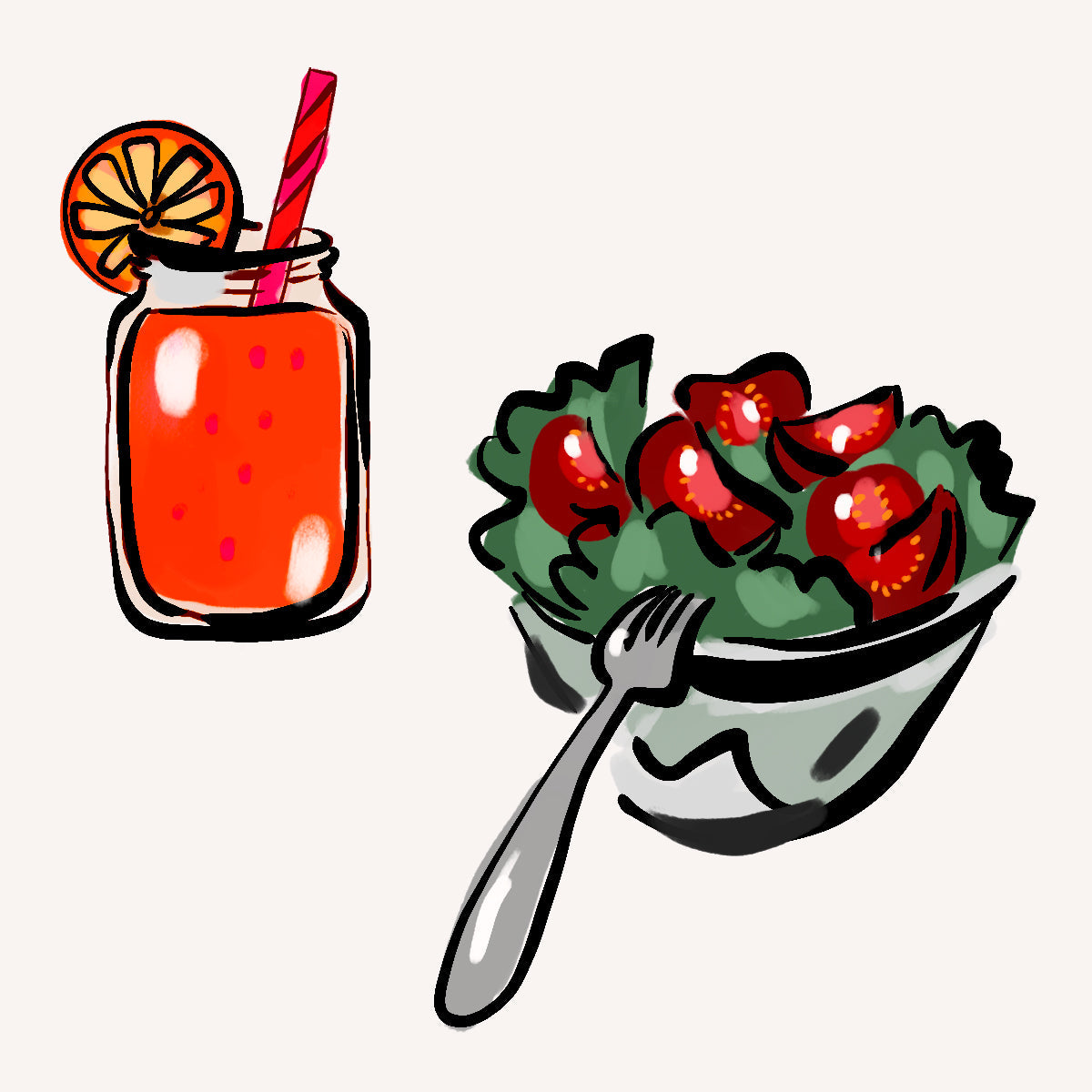
THE ULTIMATE PRENATAL VITAMIN & NUTRITION GUIDE

It’s no secret that pregnancy can impact your diet – and it should! As you grow your tiny human, your body has an increased need for many vitamins and nutrients. You’ll likely experience a need for more fuel, too. Between prenatal vitamins and pregnancy cravings, your diet may feel completely different than you’re used to. Luckily, there’s a way to ensure you are meeting nutritional goals and keeping you and your baby thriving.
Researchers, doctors, and scientists have spent years determining the optimal vitamin levels for pregnant women. Today, there are endless options for prenatal vitamins. Eating well and tracking your vitamin intake is the best kind of self-care for pregnant women.

Pregnancy means “eating for two.”
The Truth: Sorry to burst your snacking bubble, but your baby’s caloric needs won’t double your own. After all, they’re pretty tiny! If you’re carrying one baby, you’ll increase your daily caloric intake by ~340 calories starting in the second trimester, and maybe a little more in the third.
If you’re having twins, that amount increases to 600 calories. And if you’re expecting triplets, aim for 900 extra calories per day!
The Myth:
You should focus on staying lean during pregnancy.
The Truth: All pregnancy includes fat gain. Instead, stay focused on maintaining a healthy diet and exercise routine. If your doctor isn’t concerned about your weight gain, you shouldn’t be either.
It doesn’t matter how fit you are, or how quickly some celebs may bounce back. Your body needs fat because it becomes energy that you burn in labor! That fat storage is the fuel you’ll need when the big day comes, and afterwards, too. Breastfeeding and postpartum life can take a lot out of your body.
Cravings are signals about what your body needs nutritionally.
The Truth: There hasn’t been any research to link typical pregnancy cravings to vitamin deficiencies.
If you’re in the mood for orange juice, don’t worry about Vitamin C just yet. And likewise, if you’re craving something that would put you in a vitamin overdose (Ex: Liver pâté), that does not mean your cravings know something the doctors don’t.

There are specific vitamins your body needs for a thriving and healthy pregnancy. Let’s look at what these vitamins are, why your body needs them, and where you can find them in whole foods.
Aim for 1,000 milligrams daily.
Why: Calcium helps build strong bones and teeth. This is critical for moms and babies, too. During pregnancy, your changing body may put pressure on joints and bones, leading to discomfort. At the same time, you’re growing your child’s bones!
Where: Calcium is found in most prenatal vitamins, but it is also an abundant nutrient – just check out these natural sources.
- Dairy: Milk, cheese, yogurt
- Fish: Sardines
- Vegetables and Fruit: Dark green leafy vegetables (ex: kale, spinach, collard greens), rhubarb, edamame (and tofu), and figs
- Nuts and Seeds: Chia seeds and almonds
- Grains: Amaranth
Aim for 27 milligrams daily.
Why: Your blood volume increases during pregnancy to support you and your baby, and iron is important for healthy blood cells. Red blood cells deliver oxygen to your baby, and iron is used to make those red blood cells. Your iron requirements increase around week 12 of your pregnancy, as your baby grows. Your doctor may prescribe you an iron supplement if there’s concern about an iron deficiency.
Where: Most prenatal vitamins contain iron, and there are lots of places in your diet where you can step up your iron intake!
- Meat: Lean red meat, poultry, and fish
- Meatless Options: Tofu, tempeh, and seitan
- Vegetables and Fruit: Prune juice, spinach, broccoli
- Legumes and Seeds: Pumpkin seeds, beans*, peas, lentils*, and chickpeas* (*These should be dried, not canned)
- Grains: Iron-fortified cereals and quinoa
-
Other: Dark chocolate!
Aim for 220 milligrams daily.
Why: Iodine plays an important role in your body’s thyroid function, and your daily requirement increases during pregnancy. Iodine is essential for fetal brain development. In the first trimester, you baby relies on your iodine intake. Their thyroid is still developing, and they can’t secrete the hormone needed for healthy brain production yet – they need your help.
Where: Always check your prenatal vitamin to see how much iodine it contains and turn to these natural sources for help.
- Dairy: Milk, cheese, yogurt, and eggs
- Meat: Chicken, shrimp, cod, pollock, and salmon
- Vegetables and Fruits: Seaweed (Ex: nori, kelp, kombu, and wakame) and prunes
- Legumes and Seeds: Lima beans
- Other: Iodized table salt
Aim for 200 milligrams daily.
Why: DHA is a type of omega 3 fatty acid that is important during pregnancy to support the healthy development of your baby’s eyes, brain, and nervous system. Most women typically don’t have a lot of DHA in their normal diet, so it can be beneficial to begin upping your DHA intake if you’re planning a pregnancy, or as soon as you know you are pregnant.
Where: Always check for choline in your prenatal vitamin, as it’s sometimes not listed, and make sure to incorporate these foods into your diet.
- Dairy: Milk and eggs
- Meat: Beef liver*, and chicken to a lesser degree (*Beef liver should be consumed rarely during pregnancy. A maximum of 1.5 oz once or twice a month is recommended.)
- Legumes and Seeds: Soy products and peanuts
Aim for 600 milligrams daily.
Why: Folic acid is used by the body to generate new cells – something you’re doing constantly during pregnancy! While folic acid supports general growth and development of the fetus and placenta, its biggest responsibility is ensuring healthy development of your baby’s neural tube. That includes the spine and brain. Folic acid intake is associated with preventing birth defects of the brain and spine, such as spina bifida.
Where: Today, most prenatal vitamins have around 400mg of folic acid, which means the other 200mg should come from your diet.
-
Meat: Eggs, halibut, and crab
- Vegetables: Spinach, romaine, asparagus, broccoli, brussels sprouts, and mustard greens
- Fruits: Oranges and orange juice, cantaloupe, avocado, papaya, banana, and tomato juice
- Legumes and Seeds: Peanuts, sunflower seeds, and dried beans
- Grains: Fortified cereals, pasta, and bread*. (*Folic acid is so crucial that in 1998, after the results of a study on neural tube defects, the FDA began requiring enriched grain products to include folic acid.)
Aim for no more than 770 micrograms daily.
Why: Vitamin A is a powerful nutrient that promotes healthy eyesight and bone growth in the fetus. In the third quarter of your pregnancy, Vitamin A is especially crucial as your baby is growing rapidly. However, it is important to note that too much Vitamin A can have a negative effect on fetal development.
Where: Many prenatal vitamin manufacturers have reduced the amount of Vitamin A in their product or switched to including beta-carotene (a safer source of the vitamin) instead. If you monitor your intake, these foods are a great source of Vitamin A, or beta-carotene.
- Dairy: Cheese, milk, and yogurt
- Meat: Eggs, Oily fish
- Vegetables: Carrots, spinach, sweet potatoes, and red peppers
- Fruits: Mango, papaya, and apricots
Aim for 1.4mg daily.
Why: Thiamin is essential for pregnancy to help you and your baby convert carbohydrates into energy. It also assists with fetal brain development and can even raise your energy level.
Where: Check out these great natural sources for B1.
- Dairy: Yogurt
- Meat: Eggs, pork, and fish
- Fruit: Berries
- Nuts, Seeds, and Legumes: Beans, lentils, green peas, and sunflower seeds
- Grains: Whole grain fortified cereals, wheat germ, and rice
Aim for 1.4mg daily.
Why: Riboflavin does great things for your body, whether you’re pregnant or not. It maintains your energy levels, helps with good eyesight, and healthy skin. In terms of fetal development, it plays a role in bone, muscle, and nerve growth.
Where: Check your prenatal vitamin to see how much, if any, B2 it contains, and adjust your diet accordingly.
- Dairy: Yogurt, milk, and cheese
- Meat: Lean beef and pork, chicken breast, and salmon
- Vegetables: Spinach
- Nuts: Almonds
- Grains: Whole grain fortified cereals and bread
Aim for 18mg daily, never more than 100mg.
Why: There are many benefits to Niacin, as it promotes healthy skin, nerves, and digestion. However, it can be harmful to consume too much Niacin. If you are consuming high levels of B3 or on a supplement prior to getting pregnant, inform your doctor and discuss what a healthy level of B3 for your body is.
Where: There is some B3 in prenatal vitamins, but diet can also help you reach a healthy level of intake.
- Meat: Beef, pork, chicken, turkey, and fish
- Fruit: Bananas
- Nuts, Seeds, and Legumes: Peanuts, pine nuts, almonds, beans, lentils, hemp seeds, chia seeds, pistachios, hazelnuts, pecans, and walnuts
- Grains: Brown rice and fortified cereals
Aim for 1.9mg daily, never more than 100mg.
Why: Goods news! Vitamin B6 may help in some cases of morning sickness. Additionally, Vitamin B6 helps form red blood cells and ensure your newborn is born at a healthy weight. It also helps your body use protein, fat, and carbohydrates, and maintain healthy glucose levels.
Where: Check to see how much B6 is in your prenatal vitamin and vary your diet accordingly. Or swap your vitamin if it increases your B6 intake by too much when paired with your normal food intake. Always speak to a doctor about nutrition concerns during pregnancy.
- Meat: Wild salmon and safe catch elite tuna, chicken, turkey, lean pork, and lean beef
- Vegetables and Fruits: Spinach, bananas, avocados, raisins, prunes, and apricots
- Nuts and Seeds: Sunflower, pumpkin, and flax seeds; pistachios, hazelnuts, walnuts, and cashews
- Grains: Fortified or whole-grain cereals
Aim for 2.6 micrograms daily.
Why: Vitamin B12 works with folic acid during pregnancy to help prevent spina bifida and other spinal and neural birth defects in your baby. It also helps you to form new red blood cells and maintain the health of your own nervous system.
Where: Vitamin B12 is usually included in prenatal vitamins, and it exists as a solitary supplement as well. Vegans and Vegetarians might already take B12 as a supplement, and if you don’t, now is the time to start!
- Meat: Wild salmon, shrimp, beef tenderloin, red meat, and cod
- Dairy: Milk, yogurt, swiss cheese, and cottage cheese
- Other: Fortified soy milk and soy products
- Grains: Fortified cereals
Aim for 80-85 milligrams daily.
Why: Vitamin C is important to support your baby’s immune system, and to help them absorb iron. It also promotes healthy gums, teeth, and bones by aiding in the production of collagen.
Where: Vitamin C can be found in many foods, in large doses! You shouldn’t need to supplement Vitamin C during your pregnancy, but always consult your doctor if you have concerns.
- Vegetables: Broccoli, bell peppers, green beans, cabbage, spinach, and potatoes
-
Fruits: Oranges, papaya, strawberries, and cooked tomatoes
Aim for 600 iu (15 mcg) daily.
Why: Vitamin D plays an important role in building your baby’s teeth and bones. It also helps develop healthy eyesight and skin and teeth and helps promote healthy eyesight and skin.
Where: Of course, Vitamin D can be found in sunlight! Sunscreen and other factors can reduce your body’s absorption of this nutrient through sunshine, though, so try rounding out your intake through diet or supplements.
- Meat: Egg yolks, salmon, sardines, and cod liver oil
- Dairy: Fortified milk products
Aim for 15mg daily, never more than 1000mg.
Why: Your body always needs Vitamin E, and in pregnancy that need increases. That’s because it helps your body form and use red blood cells. It also helps with fetal development of healthy skin, muscles, and eyes.
Where: Many prenatal vitamins contain Vitamin E but balance your diet with some natural sources and always keep an eye on your vitamin intake.
- Vegetables: Pumpkin, red bell pepper, beet greens, collard greens, spinach, and asparagus
- Fruits: Mango and avocado
- Nuts and Seeds: Almonds, peanuts, and peanut butter
- Oils: Wheat germ, sunflower, safflower, and soybean oil
Aim for 11mg daily.
Why: Zinc helps your baby at a crucial level, supporting the construction of their cells and DNA. Zinc helps produce insulin and enzymes, and also supports your immune system.
Where: Your prenatal vitamin will likely contain a day’s worth of zinc, but you should always check and monitor your intake.
- Meat: Cooked oysters, chicken, pork chop, lobster, beef, flounder, and crab
- Dairy: Milk, cheese, and yogurt
- Nuts, Seeds, and Legumes: Beans, pumpkin seeds, chickpeas, almonds, and peas
- Grains: Oatmeal, whole grains, and fortified cereal

Prenatal+DHA is a balanced, synergistic formula that provides a curated compilation of nutrients your developing baby requires in the optimal ratios for absorption, metabolism, and safety. Prenatal+DHA is a top-rated, exclusive formula sourced directly
https://www.healthline.com/nutrition/15-calcium-rich-foods#TOC_TITLE_HDR_5
https://www.ncbi.nlm.nih.gov/books/NBK235217/
https://www.healthline.com/nutrition/healthy-iron-rich-foods#The-bottom-line
https://www.healthcentral.com/slideshow/iodine-during-pregnancy
https://www.medicalnewstoday.com/articles/iodine-rich-foods
https://modernfertility.com/blog/choline-during-pregnancy/
https://www.cdc.gov/ncbddd/folicacid/about.html#:~:text=When%20the%20baby%20is%20developing,and%20spine%20(spina%20bifida)
https://www.ncbi.nlm.nih.gov/pmc/articles/PMC6470929/
https://www.nhs.uk/pregnancy/keeping-well/foods-to-avoid/
https://www.nhs.uk/conditions/vitamins-and-minerals/vitamin-a/
https://americanpregnancy.org/healthy-pregnancy/health-nutrition/pregnancy-health-nutrition/



